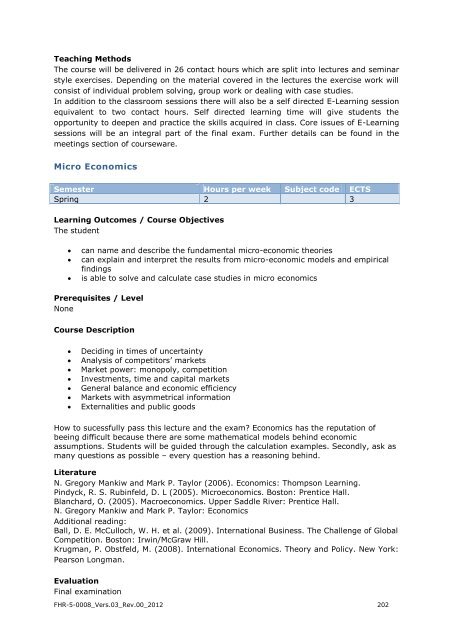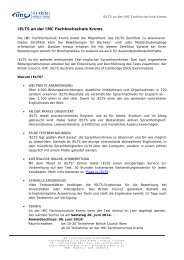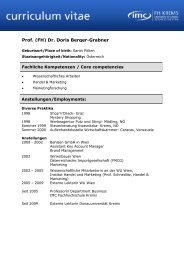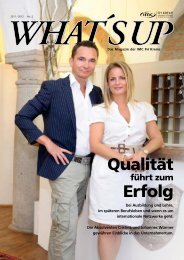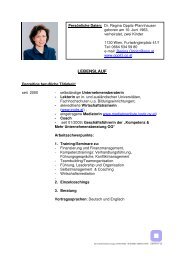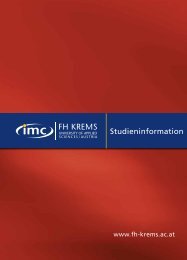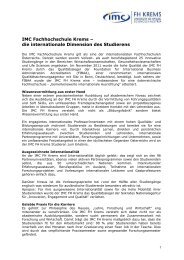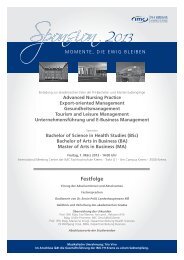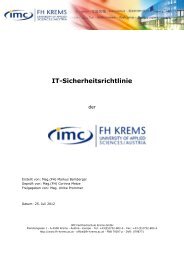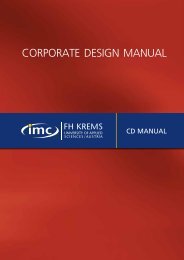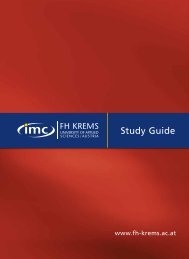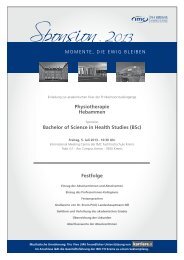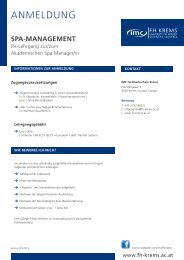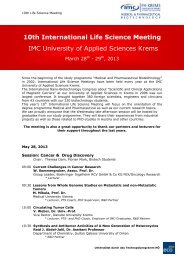- Page 2 and 3:
CONTENT EXPORT-ORIENTED MANAGEMENT
- Page 4 and 5:
MEDICAL & PHARMACEUTICAL BIOTECHNOL
- Page 6 and 7:
GENERAL INFORMATION NAME AND ADDRES
- Page 8 and 9:
General Nursing (full-time) Languag
- Page 10 and 11:
BACHELOR MASTER All full-time study
- Page 12 and 13:
Course Description This first semes
- Page 14 and 15:
� know and use efficient rhetoric
- Page 16 and 17:
Business Statistics and Mathematics
- Page 18 and 19:
Literature DAFT, Richard l.: Unders
- Page 20 and 21:
� the role of managers in the bus
- Page 22 and 23:
Course Description Introduction to
- Page 24 and 25:
Course Description See ―Arabic I
- Page 26 and 27:
Literature Required Text: ZHAO Jinm
- Page 28 and 29:
Prerequisites / Level Participant o
- Page 30 and 31:
Learning Outcomes / Course Objectiv
- Page 32 and 33:
2 nd Semester (SPRING) Accounting I
- Page 34 and 35:
Evaluation Evaluation will take the
- Page 36 and 37:
Teaching Methods The very concept i
- Page 38 and 39:
International Economics Semester Ho
- Page 40 and 41:
Course Description Introduction to
- Page 42 and 43:
After completion of this seminar, s
- Page 44 and 45:
Course Description This course incl
- Page 46 and 47:
Selection of topic, group forming,
- Page 48 and 49:
Teaching Methods The course is desi
- Page 50 and 51:
aspects of Chinese culture (e.g. in
- Page 52 and 53:
Evaluation None Russian II Semester
- Page 54 and 55:
Spanish II Semester Hours per week
- Page 56 and 57:
3 rd Semester (FALL) Controlling Se
- Page 58 and 59:
Literature Cases supplied in class.
- Page 60 and 61:
As management does consist of many
- Page 62 and 63:
� Foreign Trade Law � Internati
- Page 64 and 65:
� Identify personal characteristi
- Page 66 and 67:
Prerequisites / Level None Course D
- Page 68 and 69:
� Appraise the essence of how to
- Page 70 and 71:
Prerequisites / Level Arabic I + II
- Page 72 and 73:
This course will introduce the stud
- Page 74 and 75:
Course Description The objective of
- Page 76 and 77:
5 th Semester (FALL) Applied Comput
- Page 78 and 79:
Section 2: project, presentation, f
- Page 80 and 81:
Literature Current editions of the
- Page 82 and 83:
� Develop a research proposal �
- Page 84 and 85:
Literature Czinkota and Rokainen. I
- Page 86 and 87:
� apply financial globalization p
- Page 88 and 89:
Human Resource Management II - Mana
- Page 90 and 91:
Course Description The lessons:' to
- Page 92 and 93:
Literature Zhao Jinming, Chinese Co
- Page 94 and 95:
Loos; H., A. Berditschewski. Proekt
- Page 96 and 97:
6 th Semester (SPRING) Training Int
- Page 98 and 99:
� analyse and solve real world ca
- Page 100 and 101:
Besides the front lecturing on Envi
- Page 102 and 103:
� Understand and discuss the chal
- Page 104 and 105:
The meetings will be utilized for s
- Page 106 and 107:
The students should also be able to
- Page 108 and 109:
French V Semester Hours per week Su
- Page 110 and 111:
Learning Outcomes / Course Objectiv
- Page 112 and 113:
EXPORT-ORIENTED MANAGEMENT - Master
- Page 114 and 115:
Learning Outcomes / Course Objectiv
- Page 116 and 117:
� HR tasks in context with differ
- Page 118 and 119:
o Benchmarking � Business Strateg
- Page 120 and 121:
� Evaluate the strengths and limi
- Page 122 and 123:
consulting engagements will be used
- Page 124 and 125:
� acquire the language competence
- Page 126 and 127:
working on intercultural skills for
- Page 128 and 129:
Evaluation Projects and presentatio
- Page 130 and 131:
� Current Developments in Trade a
- Page 132 and 133:
� Definition of strategic purpose
- Page 134 and 135:
Literature Alberto Santa Maria, Eur
- Page 136 and 137:
Evaluation Case study project Resea
- Page 138 and 139:
Literature Stefano Gatti: Project F
- Page 140 and 141:
situations. Active in-class partici
- Page 142 and 143:
Teaching Methods Students will be e
- Page 144 and 145:
� business strategy and policy
- Page 146 and 147:
Teaching Methods This course will b
- Page 148 and 149:
3 rd Semester (FALL) Applied Resear
- Page 150 and 151:
Teaching Methods The lecturer will
- Page 152 and 153: will be able to apply their technic
- Page 154 and 155: Prerequisites / Level Completed BA
- Page 156 and 157: � Application and deepening of co
- Page 158 and 159: approaches to address these; (v) ap
- Page 160 and 161: TOURISM & LEISURE MANAGEMENT - Bach
- Page 162 and 163: � working with large and multiple
- Page 164 and 165: Literature ZHAO Jinming et al.: Lu.
- Page 166 and 167: Principles of Management I Semester
- Page 168 and 169: German intermediate Semester Hours
- Page 170 and 171: Italian Exercise I Semester Hours p
- Page 172 and 173: Evaluation Examinations (1 written
- Page 174 and 175: session by working through the rele
- Page 176 and 177: Course Description A Russian course
- Page 178 and 179: An introspective understanding of h
- Page 180 and 181: 5. Use selected leisure marketing c
- Page 182 and 183: 2 nd Semester (SPRING) Accounting E
- Page 184 and 185: Applied Computer Technologies (ACT)
- Page 186 and 187: we may proceed! We will start with
- Page 188 and 189: Literature Required text: Scripts:
- Page 190 and 191: Additional Sources for Individual S
- Page 192 and 193: Italian Exercise II Semester Hours
- Page 194 and 195: Both branches of law, public and pr
- Page 196 and 197: Course Description Soft skills beat
- Page 198 and 199: Final test (oral) Teaching Methods
- Page 200 and 201: Evaluation Homework Midterm Test Fi
- Page 204 and 205: 3 rd Semester (FALL) Chinese III Se
- Page 206 and 207: � can explain a position regardin
- Page 208 and 209: � deal with everyday life situati
- Page 210 and 211: � Johnson, Robert, Kuby, Patricia
- Page 212 and 213: Learning Outcomes / Course Objectiv
- Page 214 and 215: QUO, ECOS, CAMBIO 16, El TIEMPO Eva
- Page 216 and 217: � Describe trends in the travel i
- Page 218 and 219: Course Description � Budget contr
- Page 220 and 221: � can name and describe the funda
- Page 222 and 223: Cokins, G. (2004). Performance Mana
- Page 224 and 225: 5 th Semester (FALL) Bachelor Semin
- Page 226 and 227: They will also produce at home a va
- Page 228 and 229: Es werden Präsentationen und versc
- Page 230 and 231: Literature Martínez, L.; Sabater,
- Page 232 and 233: To create the information structure
- Page 234 and 235: � reflect on project content, pro
- Page 236 and 237: entertainment complex. Feedback to
- Page 238 and 239: Prerequisites / Level None Course D
- Page 240 and 241: of the course and students are expe
- Page 242 and 243: Literature 1. Sylvia Allen, 'How to
- Page 244 and 245: Literature ZHAO Jinming et al.: Lu.
- Page 246 and 247: Course Description The German in us
- Page 248 and 249: Course Description The course ―L
- Page 250 and 251: � Continuous speaking: the studen
- Page 252 and 253:
� prepare financial statements ne
- Page 254 and 255:
TOURISM & LEISURE MANAGEMENT - Mast
- Page 256 and 257:
Course Description � Congress man
- Page 258 and 259:
Course Description � Definitions
- Page 260 and 261:
Literature � Hospitality Industry
- Page 262 and 263:
2 nd Semester (SPRING) Service Desi
- Page 264 and 265:
� McCabe, S. (2009): Marketing Co
- Page 266 and 267:
� Sigala, M. & Leslie D. (2006):
- Page 268 and 269:
Spanish II Semester Hours per week
- Page 270 and 271:
4 th Semester (SPRING) Sustainable
- Page 272 and 273:
� Trompenaars, F., Hampden-Turner
- Page 274 and 275:
BUSINESS ADMINISTRATION & E-BUSINES
- Page 276 and 277:
Lehrmethoden Die Lehrveranstaltung
- Page 278 and 279:
Profilingtechniken effizient zu nut
- Page 280 and 281:
Unterrichtseinheit, sowie die Prüf
- Page 282 and 283:
� skim texts to get an overall id
- Page 284 and 285:
Kennenlernen von SPSS (Frontal und
- Page 286 and 287:
Course Description The parts of the
- Page 288 and 289:
Relationale Datenbanken Semester Wo
- Page 290 and 291:
Lehrmethoden Die einzelnen Themen w
- Page 292 and 293:
� ein betriebswirtschaftliches Th
- Page 294 and 295:
Kodex Arbeitsrecht/Verlag LINDE Int
- Page 296 and 297:
3 rd Semester (FALL) Retail Managem
- Page 298 and 299:
� Grundlagen und Ziele des Finanz
- Page 300 and 301:
Bewertungsmethoden (1) Erarbeitung
- Page 302 and 303:
Empfohlene Literatur Braun: Rhetori
- Page 304 and 305:
� a confidence in their personal
- Page 306 and 307:
Assessment Case studies and present
- Page 308 and 309:
� Zu jedem Themenblock werden ver
- Page 310 and 311:
5 th Semester (FALL) Controlling Se
- Page 312 and 313:
Mit- und Zusammenarbeit. Es soll ge
- Page 314 and 315:
Inhalt der Lehrveranstaltung � St
- Page 316 and 317:
Lehrmethoden Die Inhalte der Lehrve
- Page 318 and 319:
6 th Semester (SPRING) Content Mana
- Page 320 and 321:
IT-Security Semester Wochenstunden
- Page 322 and 323:
Lehrveranstaltungsinhalte Die Lehrv
- Page 324 and 325:
Bewertungsmethoden Prüfung, Liquid
- Page 326 and 327:
Zielsetzung / Lernziele der Lehrver
- Page 328 and 329:
Fachbereich Forschung (ANFO) Qualit
- Page 330 and 331:
2 nd Semester (SPRING) NACHHALTIGE
- Page 332 and 333:
Business Intelligence Semester Woch
- Page 334 and 335:
3 rd Semester (FALL) APPLIED RESEAR
- Page 336 and 337:
Lehrveranstaltungsinhalte Bilanzpol
- Page 338 and 339:
HEALTH MANAGEMENT - Bachelor Progra
- Page 340 and 341:
Produktion und Dienstleistungsprodu
- Page 342 and 343:
einzelnen Aufgabenbereichen setzen.
- Page 344 and 345:
Einführung in die Rechtsgrundsätz
- Page 346 and 347:
Literaturrecherche, Literaturbewert
- Page 348 and 349:
2 nd Semester (SPRING) Allgemeine V
- Page 350 and 351:
Empfohlene Literatur Bogensberger,
- Page 352 and 353:
Arbeits- und Sozialrecht Semester W
- Page 354 and 355:
Wissenschaftliches Arbeiten II Seme
- Page 356 and 357:
Lehrveranstaltungsinhalte Grundlage
- Page 358 and 359:
Lehrveranstaltungsinhalte � Grund
- Page 360 and 361:
� Investitionen und Investitionsp
- Page 362 and 363:
Die Studierenden verfügen über Ba
- Page 364 and 365:
Erforderliche Vorkenntnisse Keine L
- Page 366 and 367:
4 th Semester (SPRING) PTS - Berufs
- Page 368 and 369:
5 th Semester (FALL) Bachelorsemina
- Page 370 and 371:
Empfohlene Literatur Wird als Downl
- Page 372 and 373:
Lehrveranstaltungsinhalte � Konfl
- Page 374 and 375:
Zielsetzung / Lernziele der Lehrver
- Page 376 and 377:
Bewertungsmethoden Semesterprüfung
- Page 378 and 379:
Zielsetzung / Lernziele der Lehrver
- Page 380 and 381:
MIDWIFERY - Bachelor Programme 1 st
- Page 382 and 383:
Lehrveranstaltungsinhalte Partiale
- Page 384 and 385:
Partiale 3 Ziel ist die Vermittlung
- Page 386 and 387:
Physiologie der praepartalen Phase
- Page 388 and 389:
2 nd Semester (SPRING) Berufsprakti
- Page 390 and 391:
Empfohlene Literatur Beck-Bornholdt
- Page 392 and 393:
Administrative Aufgaben und Meldepf
- Page 394 and 395:
Partiale 2 : Die Anatomie der weibl
- Page 396 and 397:
3 rd Semester (FALL) Berufspraktiku
- Page 398 and 399:
Pathologie in der Geburtshilfe - me
- Page 400 and 401:
Mutter und Kind / Rechtsgrundlagen
- Page 402 and 403:
Lehrmethoden Inhalte sowie sprachli
- Page 404 and 405:
Empfohlene Literatur keine Lehrmeth
- Page 406 and 407:
Sie können aufgrund dieser erworbe
- Page 408 and 409:
� Kenntnisse über die unterschie
- Page 410 and 411:
Partiale 3 Präsentation - mündlic
- Page 412 and 413:
Empfohlene Literatur Cluett, Elisab
- Page 414 and 415:
5 th Semester (Fall) Pädiatrie Sem
- Page 416 and 417:
von Konzepte der primären und seku
- Page 418 and 419:
Lehrmethoden Vorträge und Diskussi
- Page 420 and 421:
transferieren die Studierenden ihre
- Page 422 and 423:
Lösungen abzuleiten und umzusetzen
- Page 424 and 425:
Lage, die freiberufliche Berufsaus
- Page 426 and 427:
Lehrmethoden Wissensvermittlung dur
- Page 428 and 429:
Fallstudien - Geburtenbereich Semes
- Page 430 and 431:
Lehrmethoden Handlungsorientiertes
- Page 432 and 433:
Bewertungsmethoden 20% Kleingruppen
- Page 434 and 435:
Rohen Anatomie des Menschen; Rohen,
- Page 436 and 437:
Diskussion. Einsatz von Medien wie
- Page 438 and 439:
� Leiden � Tod � Todeszeichen
- Page 440 and 441:
Bewertungsmethoden Teilprüfung der
- Page 442 and 443:
� Lahninger, Paul: „Reise zur L
- Page 444 and 445:
Empfohlene Literatur De Poy, E. & G
- Page 446 and 447:
Klinische Neurologie und Neuropsych
- Page 448 and 449:
Unawareness, Planen/Problemlösen,
- Page 450 and 451:
Portfolio ab (Inhalt ergotherapeuti
- Page 452 and 453:
Ergotherapie in der Orthopädie I S
- Page 454 and 455:
- kennt die relevantesten Krankheit
- Page 456 and 457:
Bewertungsmethoden Während des Sem
- Page 458 and 459:
� Curtin, M. & Fossey, E. (2007).
- Page 460 and 461:
- kennt die Prognose für die Ergot
- Page 462 and 463:
Lehrveranstaltungsinhalte Kriterien
- Page 464 and 465:
Behandlungstechniken fließen im Ra
- Page 466 and 467:
Kubny-Lüke, B. (Hrsg.) (2009). Erg
- Page 468 and 469:
4 th Semester (SPRING) Berufsprakti
- Page 470 and 471:
Supervision I Semester Wochenstunde
- Page 472 and 473:
- kennt biomechanische, motorische,
- Page 474 and 475:
� Gesundheitsförderung und Präv
- Page 476 and 477:
Community Based Rehabilitation/Serv
- Page 478 and 479:
� Fokussierte Auseinandersetzung
- Page 480 and 481:
MARKETING AND SALES - Master Progra
- Page 482 and 483:
Evaluation Exam Consumer Behaviour
- Page 484 and 485:
• Identify potential PR threats
- Page 486 and 487:
Teaching Methods Lectures are based
- Page 488 and 489:
Literature Harvard Business School
- Page 490 and 491:
2 st Semester (SPRING) Integrated M
- Page 492 and 493:
Prerequisites/Level Marketing Plann
- Page 494 and 495:
� Integration and implementation
- Page 496 and 497:
Partner Analysis, Individual and Gr
- Page 498 and 499:
Literature Lewicki, R. J., Barry, B
- Page 500 and 501:
3 rd Semester (FALL) Applied Resear
- Page 502 and 503:
Prerequisites/Level Business Partne
- Page 504 and 505:
� components of the marketing bud
- Page 506 and 507:
Literature Duxbury, R. (2009). Nuts
- Page 508 and 509:
Franceschini, F., Maisano, D. & Gal
- Page 510 and 511:
MEDICAL & PHARMACEUTICAL BIOTECHNOL
- Page 512 and 513:
Teaching Methods Most of the lectur
- Page 514 and 515:
Learning Outcomes / Course Objectiv
- Page 516 and 517:
The main objective of the microbiol
- Page 518 and 519:
Teaching Methods Laboratory Evaluat
- Page 520 and 521:
Learning Outcomes / Course Objectiv
- Page 522 and 523:
Teaching Methods Laboratory Evaluat
- Page 524 and 525:
3 rd Semester (FALL) Biochemistry L
- Page 526 and 527:
and create a strategy to solve a gi
- Page 528 and 529:
Teaching Methods Laboratory Evaluat
- Page 530 and 531:
Learning Outcomes / Course Objectiv
- Page 532 and 533:
4 th Semester (SPRING) Biochemical
- Page 534 and 535:
Evaluation In-class participation D
- Page 536 and 537:
Evaluation Study Report GLP/GMP Sem
- Page 538 and 539:
Prerequisites / Level None Course D
- Page 540 and 541:
6 th Semester (SPRING) Bachelor the
- Page 542 and 543:
Evaluation In-class participation P
- Page 544 and 545:
MEDICAL & PHARMACEUTICAL BIOTECHNOL
- Page 546 and 547:
cover user requirements, equipment
- Page 548 and 549:
Recombinant protein production and
- Page 550 and 551:
Furthermore the students will have
- Page 552 and 553:
Learning Outcomes/ Course Objective
- Page 554 and 555:
Developmental biology and new thera
- Page 556 and 557:
Prerequisites/ Level Advanced Cours
- Page 558 and 559:
Course Description Molecular drug t
- Page 560 and 561:
3 rd Semester (FALL) Diploma thesis
- Page 562 and 563:
Course Description This lecture dea
- Page 564 and 565:
� Monitoring � Quality � Frau
- Page 566 and 567:
Course Description In this Lecture


